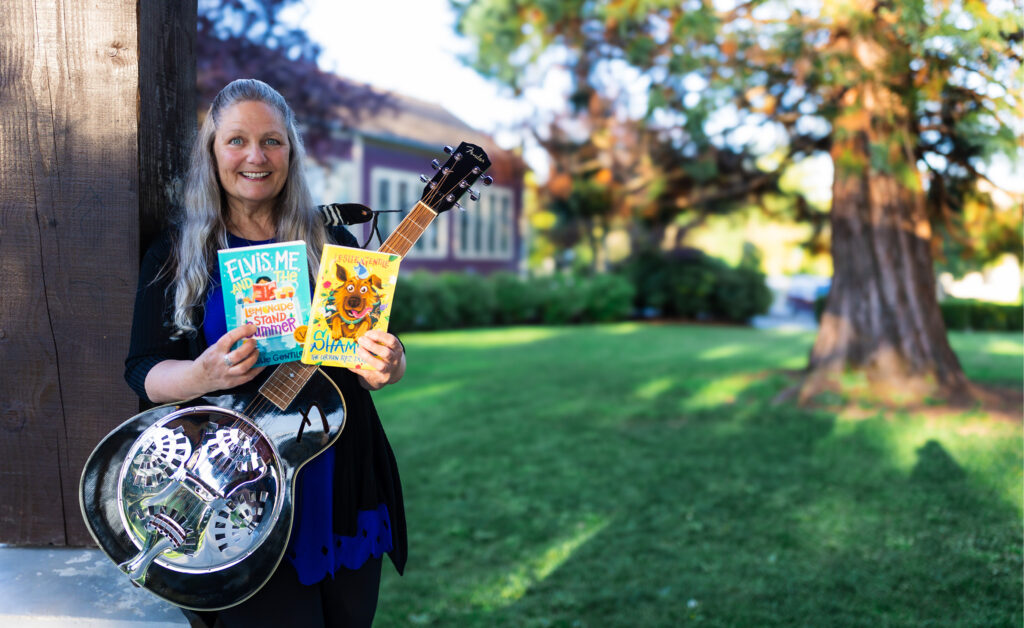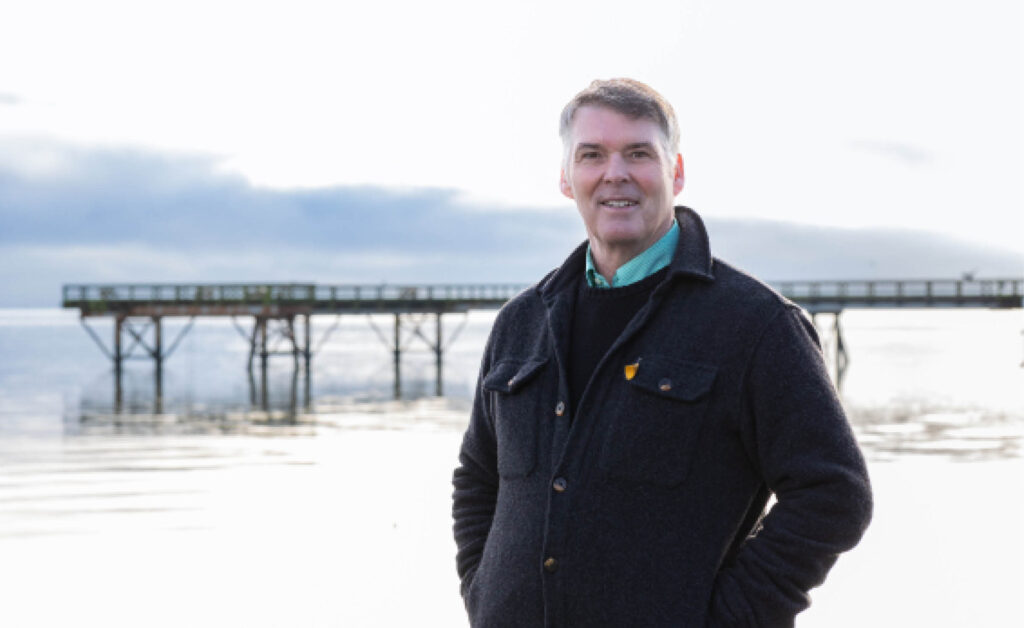by Jesse Holth | photo by Sarah Hartley Photography –
Local author Leslie Gentile, based in Brentwood Bay, will be featured at this year’s Victoria Festival of Authors (VFA). I spoke to her about what it means to find community in writing, the importance of representation, and starting impactful discussions at a young age.
Can you tell us a little about yourself? What made you decide to become an author?
I’ve been a singer-songwriter for years and have been involved in Brentwood Bay’s Music in the Park and the Brentwood Bay Festival for over 25 years. I’ve lived on the Saanich Peninsula most of my life, and we raised our family in Brentwood Bay. I sometimes get to perform with two of my adult children, who are also musicians. I always wanted to write a book, so in 2020 I decided that I’d better sit down and do it. My first book was published in 2021, and I haven’t looked back. I’ve written songs to go with my books and now perform them with my readings.
Your first book (Elvis, Me, and the Lemonade Stand Summer) won the Victoria Children’s Book Prize in 2021. What are you working on now?
My first book was life-changing! It also won the Jean Little First-Novel Award in 2022 and was shortlisted for 10 other awards – the most recent is the 2025 Washington State Library Award. My second book was released last September, and has been nominated for three awards, including The Chocolate Lily Award and The Victoria Children’s Book Prize. My third book is a sequel to the first one and will be released in November. I’m now in the early draft stages of a new book.
What inspires you to write?
In many ways, it’s my way of trying to figure out my place in the world. One of my main characters is a mix of Indigenous and settler heritage. Like me, she doesn’t know her Indigenous history and is trying to find her way. My grandparents died before I was born, and all I know is that we’re a mix of Scottish, Tuscarora and Salish. They did a great job of hiding their roots. So, in a way, this was me trying to figure out where I fit in.
You explore themes of bullying and racism in your stories. Why is it important to have these conversations at a young age?
I realized a long time ago that if we stay silent, we run the risk of teaching children that racism and bullying are okay, and with our silence, we’re actually part of the problem. Kids are smart, and they get fairness and kindness. I believe that it’s really important to proactively say: “this is unacceptable” and change the narrative. We used to tell kids that bullying and teasing is all part of life, and something that we all have to put up with. It’s time to change that old narrative. Bullying and racism are learned behaviour, and we should be supporting and teaching a better way.
Literary festivals are a great way to introduce readers to local writers. Who are some local writers you admire?
We have some amazing writers in the Greater Victoria area. My sister Karen Lee White is also a writer, and I’m a huge fan of her work. I love Kevin Paul’s two books of poetry. Linda Rogers, Sylvia Olsen, Monique Gray Smith, Rem Louie, Kit Pearson, Lorna Crozier … the list is endless!
You’ll be participating in a panel called “Writing for the Next Generation: The Importance of Indigenous Books.” What does representation mean to you?
When I was young, I never found any books by Indigenous authors, or with Indigenous characters. It was like a whole segment of the population was kept invisible. I recently did a presentation at a school where there was only one Indigenous student, and my heart went out to her as I read passages of racism from my book. She stayed afterwards to talk to me and told me that I’d written the story of her life. So, I know first-hand how important it is to see yourself in a book.
Can you describe your writing practise?
I wish I could! I am the definition of “Life Gets in the Way.” I try to write at least three hours a day, but that often gets thrown out the window. I have three young grandchildren and I’m always happy to babysit, even at the last minute. But whenever I’m doing housework or gardening, I find that I’m always thinking out a plot line so that when I do sit down to write, I’m ready to go. I’ve learned to just write when it fits into my day.
Why are literary festivals like VFA so important?
Writing is a pretty lonely profession, so getting the chance to talk to other authors is a real gift. For book lovers, it’s a way to meet authors, connect and ask them questions. Before I became an author, I attended writing festivals and loved the opportunity to hear other authors discuss their work. It can be a real glimpse inside the writing world. I’ve learned a lot from panel discussions I’ve attended over the years.
Now in its ninth year, Victoria Festival of Authors (VFA) takes place from October 16 to 20, 2024 with over 40 authors taking part in 14 events. VFA is a hybrid festival, offering in-person programming of B.C.-based writers (most also available by livestream for those viewing from home) as well as virtual programming of authors from across Canada. A vibrant, diverse festival of poetry and prose, VFA’s in-person events take place at Langham Court Theatre and on the trails of W̱MÍYEŦEN Nature Sanctuary. Accessibility is essential to VFA. They offer sliding scale pricing, with free tickets available for all virtual and indoor programming. Find VFA at www.victoriafestivalofauthors.ca.




